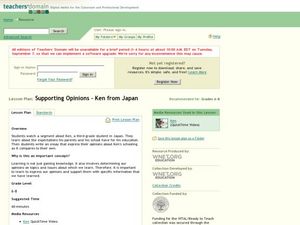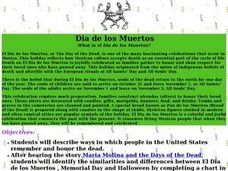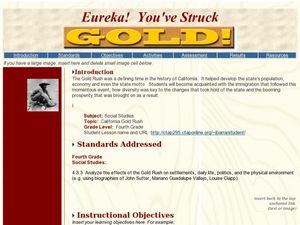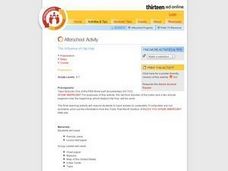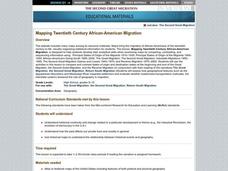Curated OER
Supporting Opinions - Ken from Japan
Students write a compare and contrast essay. In this writing skills lesson, students learn about life in Japan through a video of a Japanese third grader. Students use notes written on the video to write a four-paragraph essay to...
Curated OER
What is el Dia de los Muertos?
Students explore the Mexican celebration el Dia de los Muertos. In this Mexican celebration lesson, students discuss ways people in the US honor the dead. Students compare and contrast Mexican holidays and American holidays. Students...
Curated OER
Conditions of City Life in the Late 19th Century
Students examine tenement life. In this lesson on early urbanization, students research the role of journalism for social change in early American cities. Students write a journal article for themselves that demonstrate an understanding...
Curated OER
Eagle Boy: A Pacific Northwest Native Tale
Students read the story of the Eagle Boy. In this Native American Tale lesson, students discover the respect a boy has for wildlife. Students discuss eagles and what they symbolize. Students create song lyrics for the story and describe...
Curated OER
Writing a Business Letter to Compare and Contrast
Students compose business letters. In this writing skills lesson, students use the business letter format as they note cause and effect relationships between the weight epidemic in the United States and changing menus in American...
Curated OER
Civil War Letters
Students put themselves in the shoes of American Civil War soldiers. In this Civil War lesson, students examine letters from the time period written by soldiers, edit the letters for grammatical errors, and then present the letters to...
Curated OER
Lift Every Voice and Sing
Learners analyze sculpture, poetry, and music to gain an understanding of historical events. In this critical thinking skills lesson, students take a closer look at African-American history as they examine "Lift Every Voice and Sing'"...
Curated OER
Significant Contribution
Examine the lives of people who have made a significant contribution to society. The concept of biography is discussed with the class; they identify important actions, and read passages about Sacagawea and Benjamin Franklin. They write...
Curated OER
To Declare Independence or Not??
Young scholars debate and role play about whether the colonists should declare independence from England or not. For this American history and oral communication lesson, students read informational text about the colonists and their...
Benjamin Franklin Tercentenary
Learning the Printing Trade
Students explore U.S. History by reading biographical text in class. For this Benjamin Franklin instructional activity, students read about the famous American's first job and the transition he underwent from printing to politics....
Curated OER
Eureka! You've Struck
While incomplete, this lesson could provide ideas for a lesson on the California gold rush. Learners look at a chart to analyze population growth in San Francisco after the discovery of gold, analyze political changes that occurred, and...
Curated OER
The Influence of Hip Hop
Students consider the influence of Hip Hop on their own language use and various segments of American society; they reflect on and demonstrate their knowledge of Hip Hop vocabulary and its use.
Curated OER
Mapping Twentieth Century African-American Migration
Students develop their analytical skills when examining maps by comparing, contrasting, and sequencing information. They assess how geographical features such as the Appalachian Mountains and Mississippi River impacted settlement.
Curated OER
Bitter Sweet Legacy: Afro-Caribbean Americans and the Sugar Economy
Students study the relationship between sugar, African and Caribbean laborers, and migration. They examine the role of enslaved Africans in the creation of the Caribbean sugar industry.
Constitutional Rights Foundation
The Declaration of Independence
Your class can write a PSA about the Declaration of Independence! They write public service announcements and present them to the class. They also engage in reading and discussion activities to further understand a challenging—yet...
Center for History Education
Was the Stamp Act Fair?
Pledge your loyalty to the king and the Stamp Act or sign an oath against the tax. After simulating an in-class tax for school supplies, young historians consider the reasons for the Stamp Act and similar colonial policies. The...
North Carolina Consortium for Middle East Studies
Voices from the Trans‐Atlantic Slave Trade
Young historians trace the roots of African slavery and learn about the causes and effects of the Trans-Atlantic slave trade through a PowerPoint presentation and by reading and discussing excerpts from the book Copper Sun.
Judicial Learning Center
Do You Know Your Bill of Rights?
The Bill of Rights is much more than an important piece of paper! The rights cover everything from freedom of speech to the right to remain silent if arrested. Scholars find out their own rights by answering the questions in the form of...
Judicial Branch of California
Defining Civic Duty and Participation
A lesson, geared toward older elementary scholars, combines art with social studies to explain the purpose of civic duty and how to encourage others in the community to participate. Academics create advertising campaigns to promote civic...
Learning for Justice
Change Agents in Our Own Lives
Everyone has the power to change their own lives. Young historians learn how they can become agents for change in their own lives and the community. The lesson focuses on positive role models and what motivates individuals to promote...
EngageNY
Narratives as Theater, Part I: What is Readers Theater?
Discover the exciting world of readers theater! Scholars learn all about the reading strategy, reading a script about American heroes and completing an I Notice/I Wonder chart. Next, pupils participate in readers theater using the script.
EngageNY
Identifying Author’s Opinion and Evidence: The Value of Sports in People’s Lives, Part I
Just like instant replay, it's time to take a closer look! Pupils work together to add ideas to a Close Readers Do These Things anchor chart. They then put their knowledge to the test as they read an informational article about the...
K20 LEARN
Ichabod and Brom - Two Wild And Crazy Guys: Characters' Differing Perspectives
After reading Washington Irving's "The Legend of Sleepy Hollow," class members compare the characteristics of Ichabod Crane and Brom Van Brunt. Next, they read an article about ghosts that supposedly haunt the campus of Oklahoma...
K20 LEARN
The Eyes of Dr. T. J. Eckleburg: The Great Gatsby and the Sense of Sight
To conclude a study of The Great Gatsby, class members create a multimodal project that represents what they feel the eyes of Dr. T.J. Eckleburg see about the hidden side of one of the characters in F. Scott Fitzgerald's classic novel....
Other popular searches
- British and American English
- Colloquial American English
- Standard American English
- African American English
- The American Dream English


